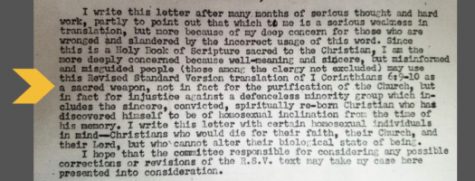The Harms Of Mistranslation
April 1, 2021
Homosexuality was never condemned or in the Bible. Over several thousands of years, the Bible has been translated into over 250 languages. Smaller sections of the Bible have been translated into over 1000 languages! Because of this, there have been many mistranslations some recent, some documented to the point where, ironically, the Bible came to spread hate instead of love against the LGBTQIA+ community.
Recent Mistranslations
The original Revised Standard Version(RSV) translation team used the words homosexuals(a term that hasn’t existed until the 19th century) in the 1946 RSV version. According to the film project called 1946: The Mistranslation that Shifted a Culture, Ed Oxford, a LGTQ+ theologian and Kathy Bolddock, the executive director of the GrandWalker Connections, went to search 90+ boxes of notes from the archives of Yale University, and uncovered two letters that documented the team’s translation mistakes.
The first letter from David S., a seminary student at the time, written to Dr. Luther Weigle, the head of the RSV team, said that they may have combined to independent words arsenokoitai and malakos into the word “homosexual“ in 1 Corinthian 6:9 when they had nothing to do with each other. He adds “unless this error of translation is corrected, the wide circulation of this version will encourage intolerance and perpetuate a great social injustice thereby discrediting the Christian church.“

Dr. Weigle wrote back admitting it was wrong and later changed the word in the New Revised Standard Revised version to “sexual perverts“ and not condemning the sexual minority in any way. However, the damage was already done as other mainstream bible verses have adopted this version. For example the German version started adopted the word homosexual in 1983 after the RSV version came out. This led to widespread animosity against the community.
God doesn’t condemn gay people, but he does condemn the immoral acts of pedophilia which was the original intention of the bible. This leads to the main concerns of the other verses in the Bible.
Past Mistranslations
So, let’s dive in to the “original“ translations and what they have been translated to. Before that, let’s address a concern: the bible isn’t God’s Will, it’s man’s interpretation of God’s will. The disciples wrote the Bible (i.e. Paul) wrote the Bible in the context of their culture and events. So the same of moral behaviors derived from today is more fitted to the context of the past, not today’s. For example, the reason why the Leviticus existed is to prevent non-consensual and sexual violations against another.
According to Mr. K, a religious teacher with 20+ years of experience and 2 degrees, one from the John Carroll University, “setting of Leviticus the Israelites are wandering in the desert after escaping two generations of slavery in Egypt you can rest assured male Egyptians would have demeaned their male Hebrew slaves by forcing rape upon them making a man lie in the position of a woman. So Leviticus may be suggesting that Israelites are better than that your brothers are much Israelites must never inflict the demeaning acts that the Egyptians and other oppressors placed upon their fellow human being.”
Also note that the bible translated over several different languages over different times, so the bible is actually a chain of man’s interpretation of man’s interpretations. Meaning can be lost when different languages don’t have the exact word. The translation over the years waters down the will of God.
But look to one of the most controversial mistranslations is in Leviticus 18:22.
In the English version, it states, “Man shall not lie with man, for it is an abomination.” Many Christian have taken this statement and associated it with homosexuality. Meaning that it is a sin for a man to be with a man and vise versa. But in other translations, this is not always the case. For example in the German translation, says, “Man shall not lie with young boys as he does with women, for it is an abomination,” when translated back into English. This translation states that pedophilia is a sin. These two translations are very different and have caused lots of frustration and violence towards homosexual individuals.
More evidence supports this. The term homosexuality only started showing up in the bible around 1946 because of a translation error. The word “arsenokoitai“ was the cause of it.
This word has gone through many translations. One is a combination of the two Greek words, “men” and “bed”. This leads to the loose translation of, “Man shall not bed with other men.” In the first English translation in 1587, it was translated to “buggers”, then to “abusers of themselves with mankind” in 1607, in 1729 it was “the brutal”, in 1755 it was “sodalites”, and finally in 1946, the word was translated to homosexual. After that, the word stayed the same just with different variations. Such as, homosexual perverts, homosexual offenders, and practicing homosexuals.
So what does this mean?
As mentioned before, we must understand that the Bible in the time and setting it was written, so we know what the Bible is originally saying, not just take it out of context. Not doing so has led to unwarranted death and injustices against the LGBTQ+ community.
This article is just explores a few arguments against the verses dealing with homosexuality in the Bible. There are many more arguments and new evidence waiting to be unfold. An example would be the to be released film called 1946: The Mistranslation that Shifted a Culture.
At the end of the day, there is nothing wrong with two consenting adults being together in a relationship. It is our society that needs to understand the Bible fully instead of picking and choosing what part of the Bible to follow.



MizMac • Apr 20, 2025 at 5:44 pm
If it was mistranslated meaning incest, then why wouldn’t the Bible also mention incest between brothers and sisters, or mothers and sons/daughters??? Also, if it meant non consensual relations, why would it only apply towards 2 males? Yes the Bible has been translated many times, but we still have the OG copy! I don’t condemn hate or violence on any human being, but as a Christian, you either follow the laws of the Bible and what it says, or you don’t and shouldn’t call yourself a follower of Christ!
Iyndia • May 19, 2025 at 9:25 am
Leviticus 18 talks about sinful relationships and touches on incest if you want to give it a read
Cindy Rich • Jul 31, 2023 at 2:05 pm
Thank you for pointing out these points. I agree that scriptures have been manipulated for hateful causes. So much hate and it near enough love.
TrueFaith • Apr 7, 2023 at 9:10 pm
This is utter garbage and a deceitful. You need to actually read and study the Bible and Greek and not insert your viewpoints. Anything can sound like anything if you really want it to. It’s ignorant and against Bible teaching too have personal interpretation. You are leading people away from God with your false teachings and putting heavy condemnation on yourself.
Sydney T • Mar 19, 2025 at 2:26 pm
Is this how Jesus would meet anyone? Is this holy love?
MizMac • Apr 20, 2025 at 5:38 pm
What is love? If someone were about to jump off a cliff and commit suicide, would you stop them even if it’s what they wanted to do?
When you love someone, you’d want them to spend eternity in heaven! Therefor, you’d tell them if they were living a sinful life, if you loved them! You can love someone while still not accepting their sinful ways! Telling people that loving them is accepting their every way, is a typical and dangerous view of the “progressive Christian’s!”